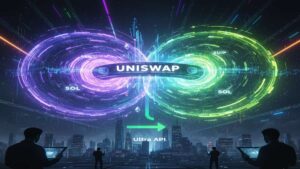TL;DR
- OpenSea is pivoting from an NFT marketplace to a trading aggregator for any token on 22 blockchains.
- The new platform is non-custodial, does not require KYC, and charges a 0.9% flat transaction fee.
- The pivot is already generating $2.6 billion in monthly volume, with over 90% coming from fungible tokens.
OpenSea is preparing for a total reinvention. The platform that once dominated the NFT market has begun a restructuring process. Following a devastating collapse of the collectibles market and massive layoffs, the company is pivoting from its NFT-only identity to become a cryptocurrency trading aggregator.
Under the new “OpenSea 2.0” vision, the platform now allows users to trade any type of token, including memecoins, NFTs, and other cryptocurrencies, across 22 different blockchains.
To achieve this, OpenSea has adopted a liquidity aggregation model, connecting to decentralized exchanges (DEXs) like Uniswap and Meteora. This service is non-custodial, meaning the platform never takes control of user funds.
Instead of performing KYC checks, OpenSea will use the analytics firm TRM Labs to flag sanctioned or suspicious addresses, charging a 0.9% transaction fee for trades.

The Immediate Impact of “OpenSea 2.0”
The decision to operate as a multi-chain aggregator is already yielding spectacular results. So far in October, OpenSea has processed $2.6 billion in trading volume. More than 90% of this figure comes from fungible token trading, not NFTs. In the first two weeks of October alone, the firm handled $1.6 billion in crypto and $230 million in NFTs, marking its strongest month in over three years.
This resurgence contrasts with the collapse of its former rival, Blur, whose activity has plummeted by more than 90%.
CEO Devin Finzer described the move as an adaptation to the new “risk-on” environment in crypto. “People don’t wake up wanting ‘a bridge’ or ‘a rollup’,” Finzer wrote. “They want one place where every asset they own, from art to tokens to game items and memes, just works.”
Based in Miami with about 60 employees, OpenSea plans to launch its own token through an independent foundation and a new mobile app. The goal, according to Finzer, is to make trading “as intuitive as Robinhood, but fully self-custodial.”





